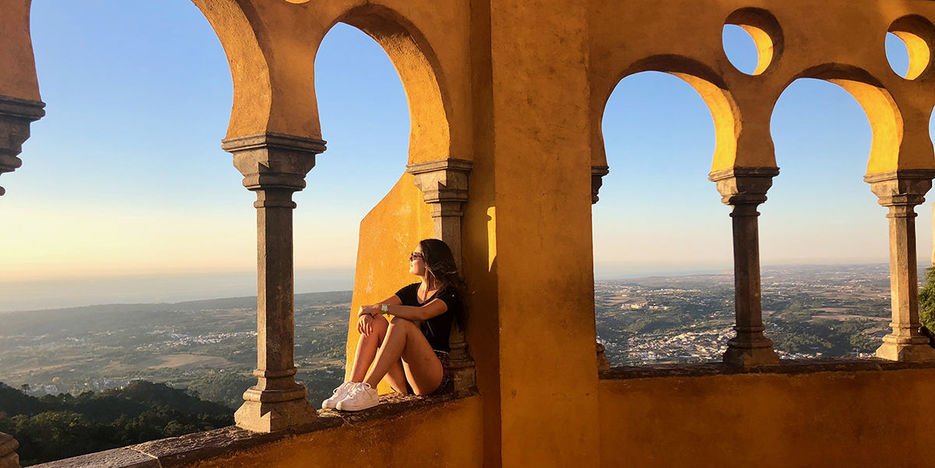
A common misconception is that students with high financial need cannot afford to study abroad. However, high financial need students do study abroad every year at various locations. The key to a successful experience abroad is planning and understanding expenses associated with studying abroad. While your housing and tuition costs will remain the same, there are additional costs to consider such as obtaining a passport and visa or booking an international flight. Whether it’s figuring out a budget or understanding the different costs of living in the study abroad program locations, Study Abroad Program Directors will help answer questions concerning affordability and costs.
The most common situations high financial need students may experience abroad include the following:
- Being more intentional than fellow students about going out to eat
- Planning limited independent travel throughout the semester
- Gaining a deeper connection to the host city/country/culture
- Feeling left out if your peers spend more freely
In collaboration with the Flatley Center for Undergraduate Scholarly Engagement (CUSE), Study Abroad has compiled information regarding the selection of programs, questions to ask yourself, tips, and additional resources. We encourage you to contact a Study Abroad program director if you have any program specific questions or if you would like to discuss your personal questions or concerns.
Selecting a Program
There are various factors to consider as you discern which study abroad program is best for you. In addition to academic and co-curricular fit, we recommend researching the cost of living to understand the differences in cost on items you buy every day. When researching a program, click “Learn More & Apply” to view detailed descriptions of each location. The “Finances” tab outlines typical out-of-pocket expenses incurred by students. This is a great resource as you start to create your own budget!
Work study is not available abroad, so understanding how you will manage your money will be critical to your success. With the generous support of alumni and donors, NDG Study Abroad is able to offer funding to students for cultural enrichment opportunities while abroad. Furthermore, with support from the Office of Financial Aid, high need financial aid recipients will automatically be considered for a variety of scholarships at particular locations.
Questions to Ask Yourself
As you consider and prepare for an international experience, you may use the following questions to help you discern your study abroad location. Please know that Study Abroad program directors are available to help answer any questions you may have as you consider the questions below.
- What funding sources do I rely on that I may not have access to abroad (like a job)?
- Which program locations have a lower cost of living?
- Does NDG issue a stipend for my location? How much is it and what does it typically cover?
- What can I do now to prepare to go abroad (save money, plan my financial aid package, apply for scholarships, etc.)?
- Do the student accommodations include meals or have kitchens to save on food costs?
- What transportation will I need to use within my host city? Can I walk between campus/home or will I have to use the subway, bus, or taxi?
- Are student discounts prevalent in this study abroad location?
- Will I want to do any personal travel on the weekends?
- Am I aware of international exchange rates and fees associated with using my banking card(s) abroad?
- How will I feel if my peers travel frequently and I cannot afford to do so? Will it negatively affect my experience if I am unable to travel as often as my peers?
Tips
Studying abroad involves new types of expenses and financial concerns for students, and no matter your financial situation, it can be challenging. If you have high financial need, these concerns can cause anxiety, especially if you incur unexpected costs. Therefore, we encourage you to prepare ahead as far in advance as possible to understand the costs associated with studying abroad. Planning ahead will make it easier for you to be financially empowered.
Start by outlining your expenses and your resources. Assume you will not be working abroad, so your total resources will be all you have for the duration of your experience.

- Meet with the Financial Aid Office to understand the financial aid resources available to you.
- If you receive Pell Grants, you are eligible for various national scholarships, including the Gilman Scholarship. We highly encourage you to meet with an advisor at the Flatley Center for Undergraduate Scholarly Engagement.
- Due to student visa restrictions, study abroad students may not be eligible to work abroad, so if you typically have a job and/or work study, you’ll need to plan for your expenses without additional income. For the amount of time you will be abroad, programs outside of Europe are often more affordable due to the cost of living.
- Pay attention to the exchange rate and understand your purchasing power with USD. 1 USD may equal 1 Swiss Franc, but if a simple lunch is 12 Swiss Francs, your purchasing power is not the same as it would be in South Bend.
- Understand your budget and pace your spending. We recommend developing a budget to know how much you can spend each week. Leftover funds at the end of the week can become your discretionary funds.
- Talk to students who have studied in your host country and ask them what they found to be cheap and what was expensive. As an example, in Mexico food is very affordable, but shampoo and sunscreen are expensive. Knowing which items are cheaper in the U.S. will help you make good packing choices.
- Find friends (local or other international students) that are also living on a budget. You will have similar spending limits and won’t be tempted to overspend.
- Eat like a local student. Cook your own meals with local food and groceries.
- Choose free cultural activities, and look for discounts for museums and other cultural experiences.
- Explore your host country instead of planning multi-city destinations. Small towns and college towns are usually less crowded and more affordable than big cities.
-
Prioritize safety over finances:
- If you are able to travel, we recommend staying in safe places and making safe travel choices. This will lower the risk of incidents that may end up costing you more in the long run.
- Eating healthy, well-balanced meals is important to keep you from getting sick, which will cost you money, time, and other resources.